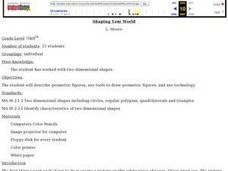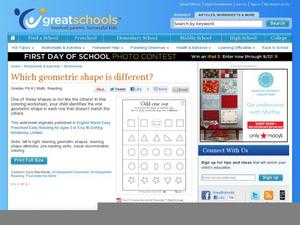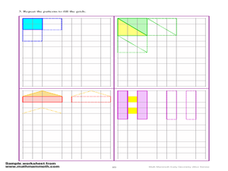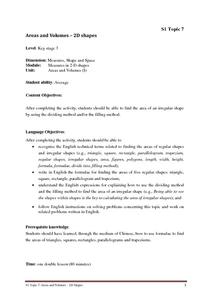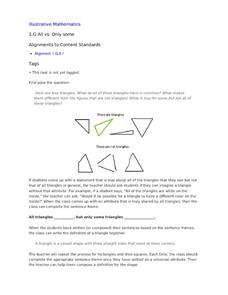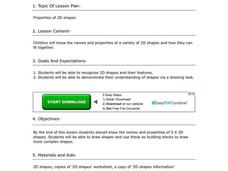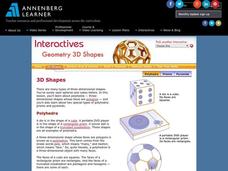Curated OER
Shaping Your World
Learners describe geometric figures. They create pictures and list each shape they used to create their pictures. They discuss the importance of shapes in their lives and create ten different geometric shapes using the Drawing tools in...
Curated OER
Symmetry and Geometric Shapes on Campus
Build on your learners' previous knowledge of geometric shapes and symmetrical figures. Then set them out to take photos of geometric shapes on campus. They assess whether the photos contain symmetry or not.
Curated OER
Which Geometric Shape is Different?
What is the difference between a star and a triangle? Its attributes of course. Discuss the basic shapes with your class, then have them practice identifying shapes by circling the one in each row that is different.
Curated OER
Draw the Shapes Positions as Directed
Following directions is an extremely important skill to master. Learners follow the directions in each sentence. Then they draw specific shapes in specific positions in the provided boxes. A good review resource.
Curated OER
Drawing Basic Shapes
Challenge your geometry class with this connect-the-dots activity! Scholars use a ruler to complete simple shapes through connecting dots in 6 shape-identification problems, and identify it from 4 choices: triangle, square, rectangle, or...
Curated OER
Guess My Shape
Learners play a game with shapes. They work in groups to identify the names and characteristics of various shapes. They give each other clues to see if others can identify the shape being described. This is a great hands on activity.
Government of Hong Kong
Areas and Volumes - 2D Shapes
Unfortunately for young mathematicians, the world isn't made entirely of parallelograms, triangles, and trapezoids. After first learning the area formulas for these common shapes, students apply this new knowledge to...
Curated OER
Recognizing 3D Shapes, Part 3
Do your first graders know the difference between cones and cylinders? Use this handy activity to help youngsters learn geometric shapes. With prisms, spheres, and pyramids, among others, this resource prompts pupils to identify each...
Curated OER
Write the 3D Shape's Name
Can your first graders identify a cone? What about a cube? Or a prism? Help them find the differences between these shapes with this worksheet, which provides a word bank for three-dimensional shapes. For extra practice, bring in...
Curated OER
Sorting 3-Dimensional Shapes
Three-dimensional shapes can be categorized based on their attributes, and scholars learn more about six figures through this sorting activity. They examine six shapes: sphere, cylinder, cone, cube, prism, and pyramid....
Illustrative Mathematics
All vs. Only Some
All shapes have certain defining attributes that set them apart from others. In order to understand this, young mathematicians look at examples and non-examples of triangles, rectangles, and squares, working as a whole class to create...
Royal Society of Chemistry
Complex Ion Shapes
Things are really shaping up! Provide young chemists with polyatomic ion practice using an interesting interactive. Individuals complete puzzles focused on molecular geometry and complex ions.
Curated OER
2-Dimensional Shapes: Drawing Shapes
Some of the best practice with shape identification comes from drawing the figures first-hand. Young geometers draw nine two-dimensional shapes: rectangle, circle, square, pentagon, hexagon, octagon, triangle with three equal sides,...
Curated OER
Finding the Area of Shapes
In this area of shapes unit, upper graders participate in hands-on problem solving activities to find the formulas for the area of a parallelogram, a triangle, and a trapezoid. They manipulate the geoboard to explore relationships among...
EEWeb
Geometry: Shapes and Solids
An excellent resource for a geometry class, as well as for an electrical engineering course. A thorough reference sheet covers geometric shapes such as triangles, parallelograms, and circles, as well as 3-D shapes and the Pythagorean...
Curated OER
Creating 3-D Shapes in Art
By learning techniques for drawing 3-D shapes, students can create realistic drawings.
Curated OER
Properties of 2D Shapes
Second graders determine how to name two-dimensional shapes by their properties. In this two-dimensional figure lesson, 2nd graders work in two groups. They work with the teacher to examine two-dimensional shapes and complete a...
Curated OER
Compare 2-D Shapes
Second graders explore and analyze plane shapes. For this plane shapes lesson, 2nd graders evaluate shape attributes to classify shapes correctly. Students work in groups to create different shapes.
Curated OER
What Shape Is That Object?
Before begining this worksheet you will need to clarify if learners are to write the 2-D, 3-D, or both version of each shape shown. They are to write the name of the shape they see. Some may be cones, spheres, or pyramids depending on...
Curated OER
Quadrilaterals: 2 dimensional shapes with 4 straight sides
Which shapes are considered quadrilaterals? View and learn that two dimensional shapes with four straight sides are considered quadrilateral. The rhombus, parallelogram, rectangle, and trapezium are only few of the fabulous shapes...
K12 Reader
Shapes on a Plane
Geometric shapes are the focus of a comprehension exercise that asks readers to examine a short passage about planes, circles, triangles, and rectangles, and then to respond to a series of questions about the article.
PhET
Molecule Shapes
The shape of a molecule is determined by the arrangement of atoms around the central atom and lone pairs of electrons. Scholars build models of molecules using single, double, and triple bonds. They can then see real molecules bond...
Annenberg Foundation
Geometry 3D Shapes: 3D Shapes
Explore vocabulary related to three-dimensional shapes. An instructional website describes the characteristics of different geometric solids. Learners can use an interactive component to view nets, faces, vertices, and edges of common...
Serendip
Diffusion and Cell Size and Shape
Is your class ready to size up the topic of diffusion? Help them get cell shape savvy with a well-written handout. The resource covers how substances such as oxygen passively move through the cell membrane and how cell size and shape...
Other popular searches
- 3 D Geometric Shapes
- 3 D Shapes
- 2 D Shapes
- Geometry Shapes 3 D Shapes
- 3 D Shapes
- 2 D Shapes
- 3 D Geometric Shapes
- Kindergarten 3 D Shapes
- 3 D and 2 D Shapes
- 3 D Shapes Worksheet
- Cylinder 3 D Shapes
- Free 3 D Geometric Shapes
